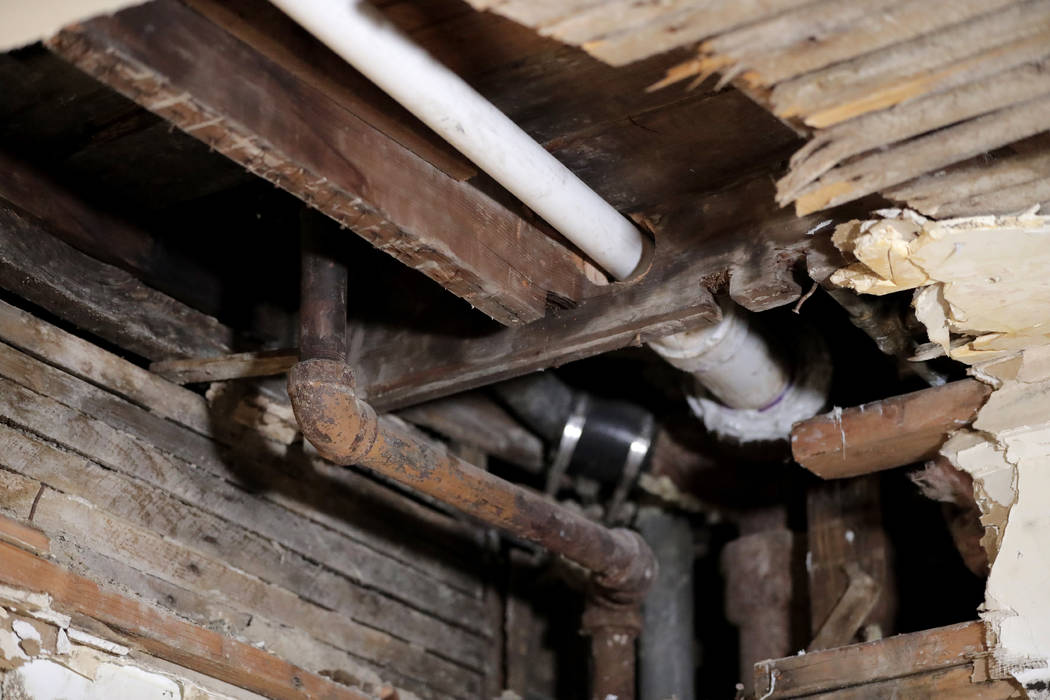EPA proposes rewrite of regulations on lead, copper in water
WASHINGTON — The Trump administration on Thursday proposed a rewrite of rules for dealing with lead pipes contaminating drinking water, but critics say the changes appear to give water systems decades more time to replace pipes leaching dangerous amounts of toxic lead.
Contrary to regulatory rollbacks in many other environmental areas, the administration has called dealing with lead contamination in drinking water a priority. Communities and families in Flint, Michigan, Newark, New Jersey, and elsewhere have had to grapple with high levels of lead in tap water and with regulatory failures dealing with the health threat.
Lead in drinking water has been linked to developmental delays in children and can damage the brain, red blood cells and kidneys. It is most often caused by lead service lines — pipes connecting a home to a water main — or lead fixtures in a home or school.
At a news conference in Green Bay, Wisconsin, Environmental Protection Agency Administrator Andrew Wheeler announced changes that include requiring water systems to test lead levels in water at schools and child care facilities. Other changes would require officials to identify the areas with the worst contamination and toughen procedures for sampling tap water.
“Today, the Trump Administration is delivering on its commitment to ensure all Americans have access to clean drinking water by proposing the first major overhaul of the Lead and Copper Rule in over two decades,” said Wheeler said. “By improving protocols for identifying lead, expanding sampling, and strengthening treatment requirements, our proposal would ensure that more water systems proactively take actions to prevent lead exposure, especially in schools, child care facilities, and the most at-risk communities. We are also working with the Department of Housing and Urban Development to encourage states and cities to make full use of the many funding and financing options provided by the federal government.”
EPA at Las Vegas school
Regional EPA administrator Mike Stoker also appeared at Dondero Elementary School in Las Vegas, one of three Clark County schools where elevated lead levels were found during testing of water in late 2017 and early 2018, to praise the district’s testing program and tout the benefits of the administration’s proposal.
Stoker said the first major overhaul of the Lead and Copper Rule since 1991 would better protect children in schools and child care facilities by requiring water systems to take drinking water samples at facilities served by the system.
Though the proposal would lower the “trigger level” — the level at which water systems would be compelled to identify actions that would reduce lead levels in drinking water — from 15 parts per billion (ppb) to 10 ppb, conservation groups were disappointed that it didn’t also reduce the level of lead contamination in drinking water systems that triggers mandatory remediation. And another change would lower the amount of lead pipe that water systems have to replace each year once the threshold is hit, cutting it from 7 percent to 3 percent.
Speed of replacing pipes
That, according to Eric Olson at the Natural Resources Defense Council conservation group, would give water utilities about 20 more years to fully replace all the lead pipes in a contaminated system.
Wheeler said a series of other, smaller changes in the new proposals are expected to offset that. Overall, he argued, the rule changes, if the White House ultimately adopts them, would mean leaking old lead pipes are “replaced at a much faster rate than ever before.”
Betsy Southerland, a senior EPA water official under the Obama administration, said the new proposals fail to boost the urgency of the country’s rules, issued in 1991, for cleaning up lead in water systems.
In Flint on Thursday, the pediatrician and public health official who helped expose the city’s lead crisis treated children at her clinic as usual. Dr. Mona Hanna-Attisha also told the Associated Press that the EPA’s proposed changes were “a missed opportunity” for not lowering the action level for lead from where it has stood for decades.
In that time, “science has taught us so much about lead — we’ve learned there’s no acceptable level,” Hanna-Attisha said. “I was hopeful the new rule would have respected current science.”
Review-Journal staff writer Mike Brunker and The Associated Press contributed to this report.

















